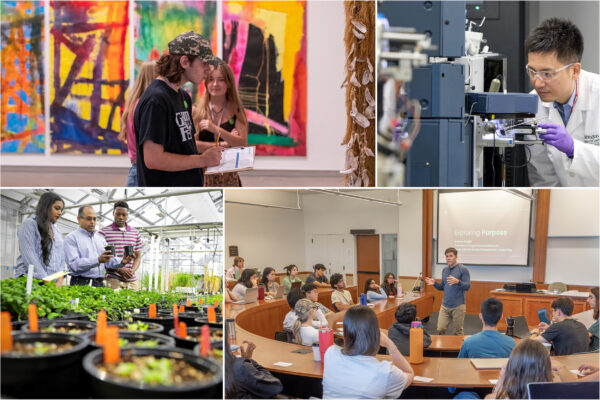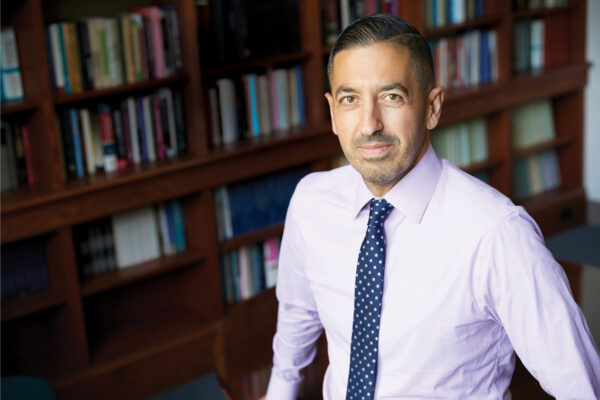Zoom out. Way out. Look at the entire planet. Expansive. Daunting challenges, but major opportunities. That’s the landscape WashU’s newest and perhaps boldest plan will consider. Through its School of Public Health, WashU is aiming to help build a world that generates health.
“Public health is about creating a world where we can all live longer, healthier lives,” says Sandro Galea, MD, DrPH, the Margaret C. Ryan Dean of the School of Public Health. “To do that, we need safer food to eat, healthier water to drink, cleaner air to breathe … safe neighborhoods, safe houses, livable wages … good medical care when we need it.”
“Public health is about creating a world where we can all live longer, healthier lives. To do that, we need safer food to eat, healthier water to drink, cleaner air to breathe …”
Sandro Galea, MD, DrPH
The new School of Public Health serves as a hub, bringing in experts from WashU’s eight other schools to elevate existing work and create synergies for new collaborations. With that in mind, the Food and Agricultural Research Mission (FARM) was launched in February to address the issue of food — its safety, security, sustainability and more — highlighting how this new culture of collaboration can work.
FARM is bringing together experts from academia and the private and public sectors with the aim of creating innovative approaches to improve nutrition and health. Researchers across the university — in public health, Arts & Sciences, engineering, medicine and social work — will deepen working relationships with farmers, local community members and others involved with food production and distribution.
“The FARM initiative is an exemplar of everything we are building here,” says Galea, also the Eugene S. and Constance Kahn Distinguished Professor in Public Health and vice provost for interdisciplinary initiatives. “It is a catalyst to science and scholarship, and an opportunity for transformative change: to train the next generation to understand that this is our role in public health, working in partnership with communities to create a healthier world.”
Morven McLean, PhD, MSc, an expert in applied agricultural research and international development, was named the School of Public Health’s executive director of networks and innovation as well as the inaugural director of FARM. She joined WashU from Gates Agricultural Innovations, where she served as director of global strategy, regulatory and public affairs. An agricultural scientist with more than 25 years of experience, McLean has served as a technical expert for the U.N.’s Food and Agriculture Organization, the World Bank and the U.S. Agency for International Development.
“FARM is going to bring together different disciplines to address some of the most pressing challenges we have: How do we produce sufficient food for a growing population? How do we do it in an environmentally sustainable way?”
Morven McLean, PhD, MSc
“Oftentimes when we think of agriculture, we’re thinking about it in a school of agriculture, but having FARM anchored in a school of public health is innovative and exciting,” McLean says. “FARM is going to bring together different disciplines to address some of the most pressing challenges we have: How do we produce sufficient food for a growing population? How do we do it in an environmentally sustainable way? How do we ensure that we’re providing safe, nutritious food that’s accessible and affordable to populations here in St. Louis, in Missouri, in the U.S., and also around the world?”
McLean is energized by the transformative work already coming from WashU and the region. “We have the highest concentration of plant scientists anywhere in the world,” she says. “Look at the spinoffs coming out of WashU and other institutions here with small startups. I’ve worked all over the world in the plant sciences, and this is truly a unique ecosystem.”
In fact, St. Louis is home to 1,000-plus plant scientists and more than 400 biotech companies and renowned institutions, including the Donald Danforth Plant Science Center and Missouri Botanical Garden. The 200-acre Cortex Innovation District — including BioSTL and BioGenerator — expands St. Louis’ agricultural innovation network, providing resources to help startups and entrepreneurs thrive. And vitally important, St. Louis is in the heart of U.S. agriculture — over half of the nation’s food production is within 500 miles.
According to McLean, FARM will harness WashU’s expertise in multiple disciplines, including public health, biology, genetics, engineering, supply-chain management and implementation science. The university already is pioneering research in pest and drought resistance and other genetic crop improvements, microbiome science, nutrition and malnutrition, eco-friendly fertilizers and next-generation medicines inspired by nature.
“The urgency of this moment cannot be overstated. Hunger, malnutrition and environmental degradation are not distant threats — they are present crises demanding immediate, coordinated action.”
Andrew D. Martin
Launched with support from the Lauren and Lee Fixel Family Foundation, FARM will reimagine the future of agriculture through a multipronged approach — recruiting top researchers, deploying agile funding models, forging interdisciplinary research networks, and uniting academia, industry, the nonprofit sector and government. Among FARM’s researchers are Lora Iannotti and Feng Jiao, both inaugural Lauren and Lee Fixel Distinguished Professors. Iannotti, a professor in the School of Public Health, is co-director of FARM, and Jiao is a professor in the McKelvey School of Engineering.
“The urgency of this moment cannot be overstated,” says Chancellor Andrew D. Martin. “Hunger, malnutrition and environmental degradation are not distant threats — they are present crises demanding immediate, coordinated action.
“Together, with our partners in St. Louis and beyond, we will transform how we grow food, nourish communities and sustain the environment. The health of regional, national and global populations depends on it.”



